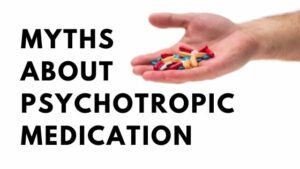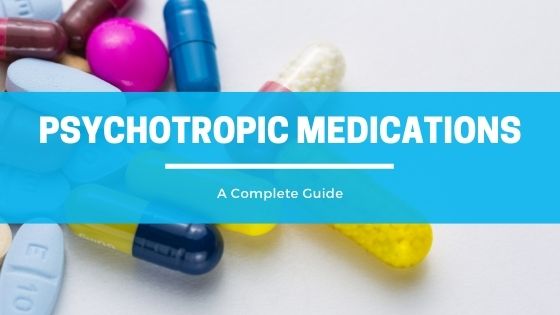Psychotropic medications are a type of medication that is used to treat mental health disorders. There are a variety of different types of psychotropic medications, and they are used to treat a wide range of mental health conditions. In this blog post, we will discuss the truth about psychotropic medications. Firstly we will talk about what they are, how they work, and who should be taking them. However, we will also dispel some common myths about psychotropic medications.
Contents
Meaning of Psychotropic Medications

Psychotropic medications impact our mood, thinking, and behavior. So, they are used to treat a variety of psychiatric disorders. However, it is important to be aware of potential side effects so that you can report them to your doctor if they occur.
Similarly, there is a variety of psychotropic medications available, each with its own set of side effects. It is most important to work with your doctor to find the medication that is best for you.
Some common psychotropic medications include:
- Anti-anxiety agents
- SSRI antidepressants
- SNRI antidepressants
- Tricyclic antidepressants
Types Of Psychotropic Medications

There are a variety of types of psychotropic medications. And the most common types are antidepressants, anti-psychotics, and anti-anxiety medications. Each type of medication has a different purpose and works differently.
Anti-Anxiety Agents
Anti-anxiety depressants can help reduce anxiety symptoms. They work by increasing the amount of serotonin in the brain. However, there are different types of anti-anxiety disorders such as sleep disorders, post-traumatic stress disorder, and obsessive-compulsive disorder.
How This Work
Firstly, your doctor will prescribe a specific anti-anxiety depressant after diagnosing the type of anxiety disorder you have. The most common types of anti-anxiety medications are:
- Benzodiazepines
- Buspirone
- Beta-Blockers
- Anti-depressants
Antidepressants are used to treat depression, but they can also be used to treat other mental health conditions such as anxiety and obsessive-compulsive disorder.
Side Effects
Side effects of anti-anxiety medications vary depending on the type of medication you are taking. Some common side effects include:
- Drowsiness
- Memory problems
- Headache
- Low blood pressure
Caution
It is important to take anti-anxiety medications as prescribed by your doctor. Do not stop taking them without talking to your doctor first. Also, be sure to tell your doctor if you are pregnant or breastfeeding before starting any new medication. Finally, never drink alcohol while taking anti-anxiety medications. It can increase the risk of serious side effects.
SSRI Anti Depressants
The doctor will prescribe a specific SSRI after diagnosing the type of depression a person has. Depression is a mental illness that can cause a person to feel sad, hopeless, and worthless. SSRIs are the most common type of antidepressant medication.
How This Work
SSRIs work by increasing the amount of serotonin in the brain. Serotonin is a neurotransmitter that helps regulate moods.
Side Effects
The side effects of SSRI antidepressants vary depending on the person taking them. Some common side effects include:
- Nausea
- Diarrhea
- Vomiting
- Weight gain or loss
Caution
It is important to take SSRI antidepressants as prescribed by your doctor. Do not stop taking them without talking to your doctor first. Also, be sure to tell your doctor if you are pregnant or breastfeeding before starting any new medication. Finally, never drink alcohol while taking SSRI antidepressants. It can increase the risk of serious side effects.
SNRI Anti Depressants
SNRI antidepressants are a newer type of antidepressant that works by increasing the levels of serotonin and norepinephrine in the brain. Similarly, they are used to treat depression, anxiety, and other mental health conditions.
How This Work
SNRI antidepressants work by increasing the amount of serotonin and norepinephrine in the brain. Serotonin and norepinephrine are two neurotransmitters that help regulate moods.
Side Effects
The side effects of SNRI antidepressants vary depending on the person taking them. Some common side effects include:
- Dry mouth
- Nausea
- Headache
- Sleep problems
Cautions
These drugs can be habit-forming. It is important to take SNRI antidepressants as prescribed by your doctor. Do not stop taking them without talking to your doctor first.
Tricyclic antidepressants
These drugs are one of the oldest classes of antidepressants that are available on the market. However, they are reserved for the situation when newer antidepressants can not work.
How This Work
Tricyclic antidepressants work by increasing the amount of serotonin in the brain. Serotonin is a neurotransmitter that helps regulate moods.
Side Effects
The side effects of tricyclic antidepressants vary depending on the person taking them. Some common side effects include:
- Drowsiness
- Nausea
- Blurred vision
- Constipation
- Weight gain
Cautions
Certain people should avoid tricyclic and these people are who have:
- Thyroid
- Enlarged prostate
- Heart issues
- Glaucoma
These drugs can increase your sugar level, so if you have diabetes check your sugar level daily.
MAOI Anti Depressants
MAOI antidepressants are the type of drug that works by blocking an enzyme called monoamine oxidase. This enzyme breaks down neurotransmitters such as serotonin and norepinephrine.
How This Work
MAOI antidepressants work by blocking an enzyme called monoamine oxidase. This enzyme breaks down neurotransmitters such as serotonin and norepinephrine.
Side Effects
The side effects of MAOI antidepressants vary depending on the person taking them. Some common side effects include:
- Drowsiness
- Nausea
- Weight gain
- Cautions
These drugs can be dangerous if you eat foods that are high in tyramine. Foods that are high in tyramine include:
- Pickles
- Soy sauce
- Brewer’s yeast
- Cheeses such as Brie and Camembert
- Red wines and beers
- Pork liver
Cautions
If you are taking MAOI antidepressants, be sure to talk to your doctor about the foods you should avoid. Also, do not take this type of antidepressant if you are pregnant or breastfeeding. Finally, these drugs can increase your blood pressure, so be sure to monitor your blood pressure regularly.
Moreover, there are a variety of psychotropic medications on the market today that can help treat mental health conditions such as depression and anxiety. So, it is important to be aware of the risk of serious side effects.
Typical Anti Psychotic
Typical antipsychotics are a type of medication that is used to treat schizophrenia and other psychotic disorders also.
How This Work
Typical antipsychotics work by blocking the dopamine receptors in the brain. Dopamine is a neurotransmitter that is responsible for the positive symptoms of schizophrenia such as hallucinations and delusions.
Side Effects
The side effects of typical antipsychotics vary depending on the person taking them. Some common side effects for example are:
- Drowsiness
- Weight gain
- Parkinsonism-like symptoms such as stiffness, tremors, and slow movement
Cautions
This class of drug can cause a condition called extrapyramidal symptoms. For example, these conditions include:
- Muscle stiffness
- Tremors
- Akathisia- a feeling of restlessness that makes it hard to sit still
- Dyskinesia- uncontrolled movements, especially in the face and neck.
Why Should You Use Psychotropic Medications?

Psychotropic drugs are mainly prescribed to treat mental and emotional disorders. They can be very helpful in restoring balance to a person’s life when used correctly. So, if you are feeling lost, or like you cannot get a handle on your thoughts or emotions, psychotropic medications may be the answer for you.
There are many different types of psychotropic medications, so it is important to work with a doctor who understands your situation and needs. Together, you can find the medication that will help restore stability and improve your quality of life.
Remember that psychotropic medications should not be taken lightly – they are powerful drugs that should only be used under the guidance of a professional. So, with careful monitoring and dosage adjustments as needed, though, psychotropic medications can provide immensely valuable relief from mental and emotional distress.
Above all mentioned, psychotropic medication drugs that should only be used under the guidance of a professional with careful monitoring and dosage adjustments as needed immensely valuable relief from mental and emotional distress.
Myth About Psychotropic Medications

However, there are over 200 types of psychotropic medications on the market, used to treat everything from ADHD to schizophrenia. And there are certain myths and misconceptions about these medications that are worth dispelling.
Myth #1: Addictive
This is simply not true. While some medications, such as opioids, can be addictive, psychotropic medications do not have this property. If you stop taking them abruptly, you may experience withdrawal symptoms, but these will dissipate over time.
Myth #2: Dangerous
Again, this is not always the case. Yes, there are risks associated with any medication, but when taken as prescribed by a doctor, psychotropic medications are generally safe and effective.
Myth #3: Only for Serious Mental Illnesses
This is also untrue. Many of these medications are prescribed to treat conditions like ADHD and anxiety, which are not considered serious mental illnesses.
Myth #4: Cause Mental Illness
This is a popular misconception, but it is not true. There is no evidence that psychotropic medications cause mental illness. They may be used to treat mental illness.
Myth #5: Last Resort
Similarly, this is not always the case. But, some of these medications can be prescribed as first-line treatment for certain conditions. On the other hand, speak with your doctor to find out if psychotropic medication is right for you.
Special Warning for Pregnant Women, Children, And Old Adults
Pregnant Women
If you are pregnant or thinking of becoming pregnant, so it is important to know that psychotropic medications can cause birth defects. However, the use of these drugs during pregnancy should be considered only if the benefits to the mother outweigh the potential risks to the baby.
Some psychotropic medications can also pass through breast milk and harm a nursing baby. So, if you are taking any of these drugs and are breastfeeding, talk to your doctor about whether you should stop nursing or stop taking the medication.
There are many safe and effective treatments for mental health problems during pregnancy and while breastfeeding. If you are pregnant or nursing and have concerns about your mental health, please talk to your doctor.
Children
Psychotropic medications can be very helpful in treating mental health problems in children and adolescents. However, they should only be used under the close supervision of a doctor.
The use of these drugs in young people can sometimes lead to problems such as weight gain, changes in mood or behavior, and difficulty sleeping. So, it is very important for parents and caregivers to closely monitor any child taking psychotropic medications.
Old Adults
Psychotropic medications are often prescribed to older adults to help with conditions such as anxiety, depression, and dementia. However, these drugs can sometimes cause serious side effects in older adults, including falls and fractures, confusion, and an increased risk of death.
So, if you are an older adult taking psychotropic medication, it is important to talk to your doctor about the risks and benefits of the drug. You should also be monitored closely for any side effects.
Conclusion
In conclusion, psychotropic medications are powerful tools that can be incredibly helpful in treating mental illness when used under the prescription of a doctor. However, they should always be used in conjunction with therapy and other treatments, and should never be taken lightly. If you are considering taking psychotropic medications, so make sure to talk to your doctor about the risks and benefits involved.
To clarify this, if you are experiencing mental health problems, don’t hesitate to reach out for help. There are many resources available to you, including therapy, medication, and self-help groups. Don’t suffer in silence – get the help you need today.
A Word From Therapy Mantra
Your mental health — Your psychological, emotional, and social well-being — has an impact on every aspect of your life. Positive mental health essentially allows you to effectively deal with life’s everyday challenges.
At TherapyMantra, we have a team of therapists who provide affordable online therapy to assist you with issues such as depression, anxiety, stress, workplace Issues, addiction, relationship, OCD, LGBTQ, and PTSD. You can book a free therapy or download our free Android or iOS app.


